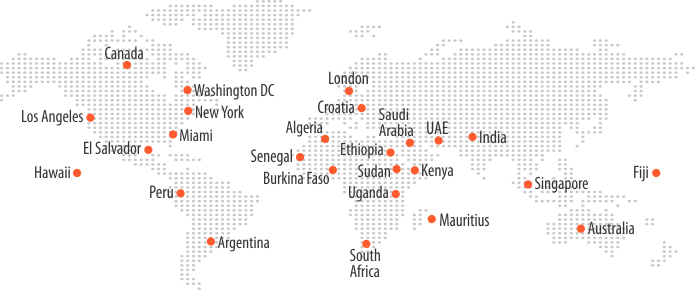VoIP security matters: 9 critical questions customers should ask their VoIP service provider

In 2022, cybercrime cost the global economy an estimated $8 trillion, by 2026, that will be over 20 trillion U.S dollars, the vulnerabilities in modern communication systems are critical. Among these, VoIP services have become the main focus for cybersecurity, as many businesses worldwide use VoIP termination for their communication needs. This widespread adoption requires robust security.
Moving from traditional telephony to VoIP brings many benefits, including communication flexibility, business expansion opportunities, and cost savings. However, it also introduces new vulnerabilities that cybercriminals are looking to exploit. The increasing number of VoIP-related security breaches—from eavesdropping and data theft to service disruption and financial fraud—means businesses must prioritize the security of their VoIP.
Understanding the Basics of VoIP Security
What is VoIP Security?
VoIP security is a broad term that covers many different measures and protocols to protect voice and data from unauthorized access, interception, and manipulation. Unlike traditional phone systems, which use dedicated circuits, VoIP sends voice data over the internet, so it’s vulnerable to the same types of attacks as other online services.
At its heart, VoIP security means confidentiality, integrity, and availability of voice. This means protecting not just the voice data itself but also the underlying infrastructure that supports VoIP services.
Common Security Threats in VoIP
The VoIP world is full of many security threats that can compromise integrity, confidentiality, and availability of voice. Knowing these threats is key for service providers and customers to implement countermeasures.
One of the biggest threats is eavesdropping, where malicious actors intercept voice data sent over the internet. Unlike traditional phone lines, VoIP calls can be intercepted anywhere in the network, making them vulnerable to interception. Advanced attackers can capture voice data packets, reassemble them, and listen to entire conversations, exposing sensitive business information or personal details.
Denial of Service (DoS) attacks are another big threat to VoIP systems. These attacks flood the network or VoIP infrastructure with traffic, making the service unavailable to legitimate users. A successful DoS attack can cause significant business disruption and financial loss for businesses that use VoIP for customer communication or internal collaboration.
Vishing is a social engineering technique that combines voice and phishing. Attackers impersonate legitimate entities like banks or government agencies to trick people into revealing sensitive information like credit card numbers or social security numbers. The personal nature of voice communication makes these attacks very convincing and dangerous.
Call tampering and call hijacking are threats that target the integrity of VoIP communications. Incall tampering, attackers modify the voice packets in transit and can change the meaning of the conversation. Call hijacking redirects calls to unauthorized destinations, which can lead to eavesdropping or interception of sensitive information.
Malware targeting VoIP systems is a growing threat. These malicious programs can infect VoIP devices or infrastructure and allow attackers to monitor calls, steal data, or use the compromised systems as a springboard to attack the network.
Lastly, toll fraud is still a big problem in the VoIP world. Attackers exploit VoIP vulnerabilities to make unauthorized calls, often to premium-rate numbers, and the victim is charged. This type of fraud can go undetected for a long time and can cause significant financial loss to businesses.
Key Security Features to Look for in a VoIP Service Provider
When looking at VoIP wholesale providers or any VoIP service, you should be looking at the following security features:
Encryption and Data Protection
Encryption is the foundation of VoIP security. It makes voice data unreadable to anyone who might intercept it during transmission. When talking to potential providers about encryption, you should be asking:
- Types of Encryption: Look for providers that use robust encryption methods, such as Transport Layer Security (TLS) for signaling and Secure Real-time Transport Protocol (SRTP) for media streams.
- End-to-End Encryption: This means data is encrypted from sender to recipient.
- Key Management: How are encryption keys generated, distributed, and managed?
Network Security Protocols
A secure VoIP service relies on a secure network. Ask providers about:
- Firewalls: How are firewalls configured to filter VoIP traffic? What threats are blocked, and what legitimate traffic is allowed to flow through?
- Intrusion Detection Systems (IDS): Are IDS systems in place to monitor network traffic for suspicious activity and security breaches?
- Network Segmentation: Is VoIP traffic isolated from other data traffic to prevent cross-contamination in case of a security breach?
- Regular Vulnerability Assessments: Are regular scans and assessments done to identify and fix weaknesses in the network?
Authentication and Access Control
Strong authentication is key to preventing unauthorized access to VoIP systems. Ask about:
- Two-factor authentication (2FA) or Multi-Factor Authentication (MFA): What extra layers of security beyond passwords?
- Role-Based Access Control (RBAC): Users should only have access to what they need for their role within the organization.
- Password Policies: Do they enforce strong password requirements and provide secure password management tools?
- Session Management: How do they manage and secure active sessions to prevent unauthorized access?
VoIP Security Questions
Ask these questions when looking at VoIP services or your current provider. Here are some to ask:
Data Encryption and Privacy
- What kind of encryption do you use for voice and data?
- How do you do end-to-end encryption?
- Can you walk me through your key management for encryption?
Network Infrastructure Security
- What do you have in place to protect your network from attacks?
- How do you monitor and respond to threats in real time?
- Can you explain your network segmentation for VoIP?
User Authentication and Access Controls
- What options do you have for user authentication?
- How do you manage and store user credentials?
- Do you offer MFA?
How to Assess a VoIP Service Provider’s Security?
When evaluating a VoIP service provider’s security, you need to look beyond the surface and examine their security practices, certifications, and incident response. This is key to ensuring the provider can protect your sensitive communications and data.
Comprehensive Security Audits and Certifications
One of the best indicators of a VoIP provider’s security is its adherence to industry-recognized security standards and certifications. Certifications like ISO 27001 show the provider has a systematic approach to managing company and customer data. SOC 2 compliance means the provider has been audited by a third party and meets the security, availability, and confidentiality criteria.
Ask for detailed information on these certifications, including the scope of the audit, the date of the most recent certification, and any areas for improvement found during the audit. Also, ask about any additional industry-specific certifications that may apply to your business, like HIPAA for healthcare-related communications.
But remember, certifications alone don’t mean impenetrable security. They are the foundation upon which the provider builds their security practices. Ask about the frequency of security assessments and how they address any vulnerabilities found during those assessments.
Robust Incident Response and Disaster Recovery Plans
Even with the best preventative measures, security incidents can still occur. The true test of a VoIP provider’s security is often how they respond to and recover from those incidents. A prepared provider should have an incident response plan that outlines the procedures for detecting, containing, and mitigating security breaches.
When assessing a provider’s incident response, ask:
- What is the composition and availability of the incident response team
- How do they classify and prioritize security incidents
- How long will it take to respond to different types of security events
- How will affected customers be notified in the event of a breach
- Post-incident analysis and lessons learned processes
Just as important is the provider’s approach to disaster recovery and business continuity. Ask about redundancy measures, data backup procedures, and how they will maintain service availability in the event of different disaster scenarios. Ask for their recovery time objectives (RTO) and recovery point objectives (RPO) so you can understand how quickly services can be restored and how much data will be at risk in a worst-case scenario.
Transparent Security Communication and Customer Education
A VoIP provider’s security commitment should extend beyond their internal practices to communicating with their customers. Transparent providers will have clear channels for sharing security updates, alerting customers to potential threats, and providing guidance on securing their VoIP communications.
Look for:
- Regular security bulletins or newsletters
- A dedicated security portal for customers
- Training resources to help customers understand and implement security best practices
- Clear escalation paths for reporting suspected security issues
Providers should be willing to talk openly about their security without hiding behind vague statements or technical jargon. They should be able to explain their security architecture, encryption, and access control in terms that make sense to your business and your level of security expertise.
By asking these questions, you can make an informed decision about who to trust with your communications. Remember, it’s not about finding a provider with the most security features but one whose security philosophy and practices match your business needs and risk profile.
VoIP Security: Trust Bankai Group for Your Secure Communication
As VoIP grows, security has never been more important. Whether you’re a small business or a large organization looking for wholesale VoIP termination, you need to know and secure your communication systems.
Ask the right questions, evaluate your providers, and implement full security solutions, and you can reduce the risk of breaches and secure your VoIP communications. Trusting a provider’s security is not enough; you need to verify and complement it with your vigilance.
Bankai Group offers comprehensive, secure VoIP termination services to protect communications and mitigate risks. Connect with our experts to learn more about our secure VoIP solutions and how we can support your communication needs.






